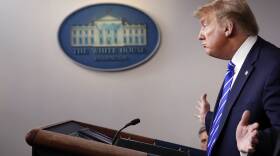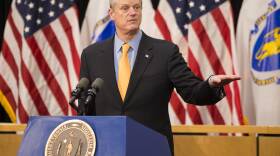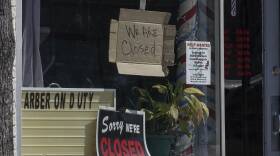EXPLORE MORE
Coming up Thursday on BPR:
NBC’s Chuck Todd
Former Massachusetts Secretary of Public Safety Andrea Cabral
Environmentalist Bill McKibben
Boston University's Anthony Jack on his new book “Class Dismissed: When Colleges Ignore Inequality and Students Pay the Price"
Recent segments
-
New Bedford Mayor Jon Mitchell: For An Industrial City, 'Zoom Doesn't Do You Much Good'
In New Bedford, fishing and warehouse work continues amid the coronavirus pandemic. -
Cabral Talks About ‘Extraordinary’ Decision By Judge Overseeing Flynn Case
The former Suffolk County Sheriff had qualms with the Justice Department’s motion to drop charges against the former national security advisor, who pled guilty to lying to the FBI in 2017. -
John King: Trump’s Trying To Distract Voters With Baseless Scarborough Conspiracy
CNN’s chief national correspondent said the president is likely looking to stoke his base ahead of the November elections. -
Juliette Kayyem On Massachusetts' Phase 1 Of Reopening Next Week
The world that we reopen into will be "180 degrees different" from our previous idea of normal, Kayyem says. -
Art Caplan To Lockdown Protesters: 'Take Responsibility' For Putting Lives At Risk
The medical ethicist said activists should take more responsibility for putting others' lives at risk. -
Economist Jonathan Gruber: 'We Absolutely Do Need More Stimulus'
The one-time $1,200 stimulus check just won't be enough for Americans to survive a long economic recovery, Gruber says.
Listen to previous shows
-

BPR Full Show: Buy Nothing
Today on Boston Public Radio: Michael Curry discusses the importance of community partnerships in increasing vaccination levels, and weighs in on opinions on the mayor’s race in Boston’s Black community. Curry is the president and CEO of the Massachusetts League of Community Health Centers and a member of Gov. Charlie Baker’s COVID Vaccine Advisory Group. He’s also a member of the National NAACP Board of Directors and chair of the board’s advocacy and policy committee. Then, we ask listeners about whether they think a recent rise in union actions symbolizes genuine change, or if the current push for better labor practices will fizzle out. Dr. Katherine Gergen Barnett takes questions from listeners about all things vaccine related, as authorization for children aged 5-11 nears and people begin to mix and match booster shots. Gergen Barnett teaches in the Department of Family Medicine at Boston Medical Center and Boston University Medical School. Revs. Irene Monroe and Emmett G. Price III talk about how Evangelical Christians are looking for a new label for their community. Monroe is a syndicated religion columnist, the Boston voice for Detour’s African American Heritage Trail and co-host of the All Rev’d Up podcast. Price is the founding pastor of Community of Love Christian Fellowship in Allston, the Inaugural Dean of Africana Studies at Berklee College of Music and co-host of the All Rev’d Up podcast. Susan Orlean previews her latest book about animals, including the history of the movie “Free Willy,” her relationship with turkeys and her Valentine’s Day spent with a lion. Orlean is a staff writer for the New Yorker, and an author; her latest book is “On Animals.” We end the show by talking with listeners about their experiences with “Buy Nothing” Facebook groups and efforts for sustainable buying and selling. -

BPR Full Show: Speak Now or Forever Hold Your Peace
Today on Boston Public Radio: Stacey Abrams talks about what voters and politicians need to do to safeguard democracy, after Republicans blocked the Democrats’ voting rights bill in Congress. She also weighs in on the status of Democratic negotiations over President Joe Biden’s spending bill. Abrams is a voting rights activist, former Georgia State Representative and author. Then, we ask listeners how they approach compromise and negotiation following Stacey Abrams’ conversation about political compromise. Shirley Leung pushes for ending tent encampments and providing housing for those at Mass. and Cass and weighs in on rent control, in her latest column on the Mass. and Cass crisis. Leung is a business columnist for The Boston Globe and a Boston Public Radio contributor. Sue O’Connell discusses one of the first rural health clinics by and for transgender people located in Northampton, and weighs in on when celebrities who commit harm can return to the public eye. O’Connell is the co-publisher of Bay Windows and the South End News, as well as NECN's political commentator and explainer-in-chief. Then, we ask listeners their thoughts on marriage, following a New York Times article about how the married may soon become the minority. Andy Ihnatko updates listeners on the latest tech headlines, including Facebook’s upcoming rebranding, Donald Trump’s new social media platform, Google’s new signature phone and issues with Tesla’s self-driving cars. Ihnatko is a tech writer and blogger, posting at Ihnatko.com. -

BPR Full Show: Sublime Snacking and Celebrity Sighting
Today on Boston Public Radio: Chuck Todd begins the show by talking about what he thinks will get cut from the Democrats’ spending bill, and what “reconciliation” actually means. Todd is the moderator of “Meet the Press,” host of “Meet the Press Daily” on MSNBC and the political director for NBC News. Then, we asked listeners if they plan to get their kids vaccinated, as FDA authorization is expected to go through for children aged five to 11 in the coming weeks. Andrea Cabral discusses jury selection in the trial of Gregory McMichael, Travis McMichael and William Bryan, who shot Ahmaud Arbery in February of 2020. She also talks about today’s House vote on whether or not to hold Steve Bannon in contempt for defying a subpoena from a committee investigating the Jan. 6 insurrection. Cabral is the former Suffolk County sheriff and the former Massachusetts secretary of public safety. She is currently the CEO of the cannabis company Ascend. Paul Reville unpacks the boom in enrollment at Christian schools, and an elite Concord school cancelling its invitation to Nikole Hannah-Jones to speak about The New York Times’ 1619 Project. Reville is the former Massachusetts secretary of education and a professor at Harvard University’s Graduate School of Education, where he also heads the Education Redesign Lab. His latest book, co-authored with Lynne Sacks, is “Collaborative Action for Equity and Opportunity: A Practical Guide for School and Community Leaders.” Folu Akinkoutu talks all things snacks, including her recollections of helping her parents run vending machines, her favorite food fusions across cultures and snack containers that dredge up childhood memories. Folu Akinkuotu is the Boston-based creator of the Unsnackable newsletter. Jon Gruber highlights the legacy and importance of the Nobel Memorial Prize in economics, and how Joshua Angrist’s win for “natural experiments” in the field contributed to the rise in prominence of empirical economic research. Gruber teaches economics at MIT. He was instrumental in creating both the Massachusetts health-care reform and the Affordable Care Act, and his latest book is “Jump-Starting America: How Breakthrough Science Can Revive Economic Growth And The American Dream.” We end the show by asking listeners about their celebrity encounters, after John Legend tipped a street performer playing “All of Me” outside Faneuil Hall. -

Is There Such Thing as an Eco-Friendly Steakhouse?
When diners visit Seattle steakhouse Bateau, they’ll find steakhouse staples such as prime rib and filet alongside more obscure cuts like ranch and coulotte. Award-winning food writer Corby Kummer joined Boston Public Radio on Wednesday to share his thoughts on Bateau’s efforts to become an environmentally sustainable steakhouse, following New York Times contributor Brett Anderson’s profile on the restaurant. “[Bateau is] only offering the cuts of meat that their farmers, who use pasture-raised cattle and practices they approve of, have available,” Kummer said. “So if it’s out for the night, you have to have something else at the restaurant.” “This restaurant is also experimenting with different ways of cooking meat, so it’s tender and palatable,” Kummer added. Kummer noted that the chefs and owners of Craigie on Main in Central Square and Alden & Harlow in Harvard Square are just two examples of the “many local chefs who’ve been into this method.” “The whole idea for them is, ‘we want to support local farmers — local farmers aren’t corn finishing on huge meat lots in Texas. It’s grass-fed — often that needs a sharp knife — and we’re going to show you, the diner, how delicious it can be,’” Kummer said. “It’s just not what you’d get at a national steakhouse chain that subscribes to environment-destroying animal raising.” Kummer is the executive director of the Food and Society policy program at the Aspen Institute, a senior editor at The Atlantic and a senior lecturer at the Tufts Friedman School of Nutrition Science and Policy. -

BPR Full Show: Don't Bet on Supply Chains
Today on Boston Public Radio: Art Caplan discusses the first ever successful genetically modified kidney transplant, which could be a breakthrough for those waiting for transplants. He also talks about the latest in mixing vaccines for booster shots. Caplan is the Drs. William F. and Virginia Connolly Mitty Professor and founding head of the Division of Medical Ethics at NYU School of Medicine in New York City. Then, we ask listeners about their thoughts on sports betting as Connecticut just launched online sports betting, which remains illegal in Massachusetts. Juliette Kayyem weighs in on the acceleration of China’s national space program, and updates listeners on the status of President Joe Biden and the United States’ approval ratings. Kayyem is an analyst for CNN, former assistant secretary at the Department of Homeland Security and faculty chair of the homeland security program at Harvard University’s Kennedy School of Government. Howard Mansfield previews his latest book, “Chasing Eden: A Book of Seekers,” about communities throughout American history that sought freedom, happiness and utopia. Mansfield is an author who writes about history, architecture and preservation. Corby Kummer discusses how supply chain shortages could affect the food industry, and what happens when outdoor dining converges with the city’s homelessness crisis. Kummer is the executive director of the Food and Society policy program at the Aspen Institute, a senior editor at The Atlantic and a senior lecturer at the Tufts Friedman School of Nutrition Science and Policy. We end the show by asking listeners what they’re hoarding amid the latest slew of supply chain issues.









